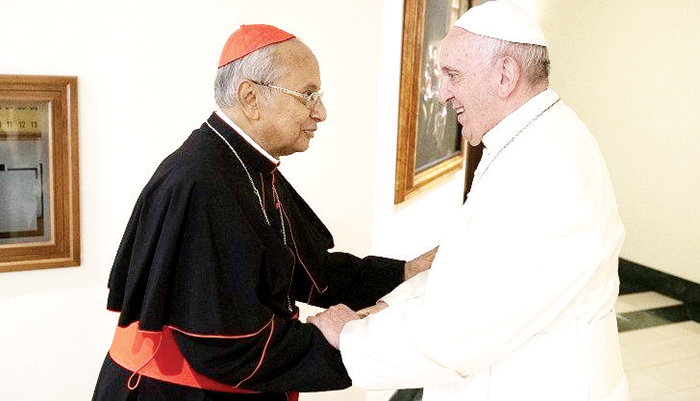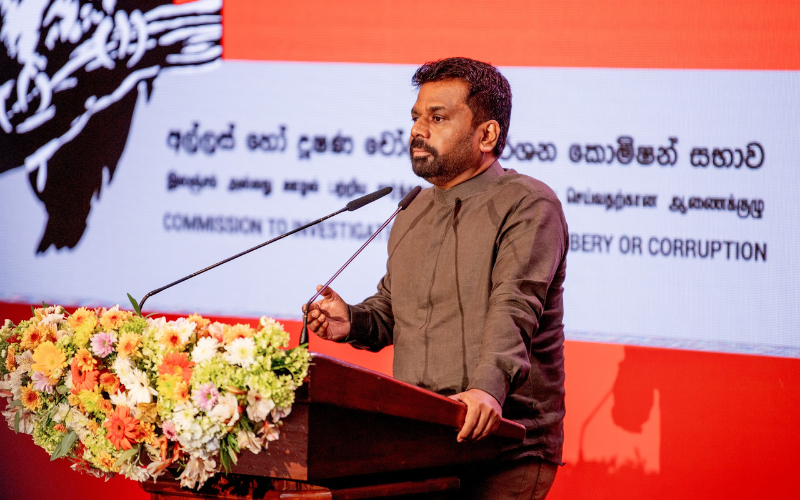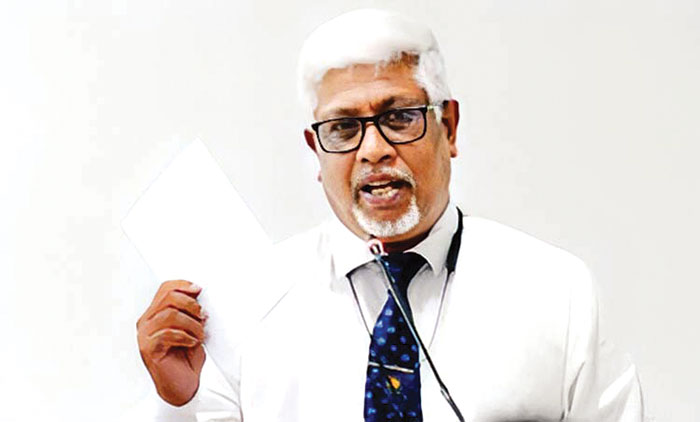News
Cardinal Ranjith reacts to Pope Francis’ 100,000 Euro gift for Lankan families

By Deborah Castellano Lubov
(Vatican News) Cardinal Malcolm Ranjith of Sri Lanka is grateful to Pope Francis for, taking the initiative to send 100,000 Euro to help families of victims and survivors of the 2019 Easter Sunday terror attacks.
In an interview with Vatican News, as the country’s ongoing economic, political and financial crises reach new heights, the Archbishop of Colombo, who served in the Vatican for many years, reflects on the Holy Father’s generosity which is destined to reach some 400 families at the targeted Catholic and Evangelical Churches where suicide bombers claimed 269 lives.
The Cardinal also discusses whether the security concerns for the local church have been addressed, and whether this remains a constant cause for concern, and offers Vatican News his view of what is required for Sri Lanka to escape from its political, economic, and social crises.Your Eminence, could you tell us about the grant of €100,000 that Pope Francis has given to families of victims and survivors of the 2019 Easter Sunday terror attacks in Sri Lanka?
When I came to Rome and met His Holiness in February this year, he asked me about the welfare of these people, how they are faring and expressed his concern for their needs. So, on his own initiative, he asked me whether he could help us financially, and I said, okay, we are very grateful to him for that. He asked me how much. I said: “Whatever you give, will be welcome”. Then he told me that he had a donation from somebody amounting to €100,000 and that he would give me €50,000. He asked me for the account number of our diocesan funds which I gave to him and when I went back in April and checked the account, I found that he had credited €100,000 to our account. He had given the full amount. I found that he was extremely helpful to our people and we are very grateful to him for that, for the concern and for the constant attention that he has been paying to the needs of these people.
And how will this support be distributed among the families of the victims? I imagine it is a very much appreciated support, especially given the economic crisis the nation is facing right now.
Due to the current economic crisis, these people too, are in great need of help. So, we have decided we are going to give that money now and to distribute it in an equitable fashion, according to the needs and the various challenges that these families are facing, and have worked out a kind of a scheme. We allocated the entire sum to 400 families from the St Sebastian’s Church in Katuwapitiya, Negombo City, and St Anthony’s Church in Kochchikade. We also gave a certain amount to families of the Evangelical Church in Batticaloa, and sent it to the local Caritas office so it can be distributed to those people. Moreover, we allocated some more substantial amounts for those who are bedridden and who need constant medical care, and have to pay for nursing and other things. So, considering this, we gave them a bigger amount. We distributed the grants during a ceremony last week-end, in which we invited the Apostolic Nuncio.And is the local Church still in a process of recovery and coming to terms with these attacks?
There are two sides to the question. One is, of course, that there are various needs: economic, physical, medical and psychological needs. So, we continue to take care these needs as much as we can. After the attacks, there was an outpouring of charity from all over the world. So we created a special fund, and some of that money is still available, and we will continue to look after these people even in the future.
On the other hand, we have the question of justice, that of knowing the truth behind these attacks. It is a much more serious question for them, because they want to know who and why this happened to them. 269 people died in the blasts and then three policemen were killed in another blast as they went to arrest some people involved, which brings the total to 272. So we have answer to these questions regarding the entire attack: who was really behind it, and why it was carried out. Until we get clear answers on this, our people will not be satisfied.
My next question had been about to what extent the security concerns for the local church been addressed and are there still worries about the situation there? Based on what you’ve just said, it seems that there is still much work to be done.
Yes, the problem with the country, of course, is much bigger, because of wrong policies and wrong economic management. The country has gone down a precipice. We are in the midst of a financial crisis, a serious financial crisis, where many people are unemployed or underemployed. As a result, they have no income for their families. This has affected the general population. Besides that, there are also other questions: industries have all collapsed, we have huge debts to be paid to other countries for useless projects that had been promoted by the previous governments, more for personal enrichment than for the people’s development.
These projects have caused a huge debt problem in the country and we don’t know how to get out of it. So, the national income and the production capacity of the country has fallen so that we cannot pay our way through the basic needs of the people, like electricity, coal to run the power generators, and diesel and petrol needed by farmers, fishermen and other people to run their businesses. All of that has collapsed and the income of families has been badly affected. Because of this, we have a serious financial crisis and all of us are going to have serious difficulties.Referring to that economic and political crisis. In your opinion, Your Eminence, what is needed to escape or to get out of this?
The country has also suffered a serious erosion of democracy, which has been caused by three factors. The first one is the gradual deterioration of the rule of law and the interference of political leaders in the judiciary, which has made justice a non-issue for our people. So, we want that to be rectified. Secondly, the corruption levels of our political system are very high, and only a few people — or rather a few families — have been earning endlessly, while many families are in dire poverty. So, this corruption must stop, and an effective means of controlling it must set up. Thirdly, human rights violations are on the rise, and the more people protest, the more oppressive the governments have become. So, there are a lot of unanswered issues.
All of this requires a transformation in our society. We want the international community to pressurize our government to ensure that these errors are corrected and we ask that aid be given to us in a way that corruption doesn’t occur anymore. Aid should be given to our country, but with clear-cut conditions so as to preserve democracy, the rule of law, honesty and safeguard human rights.
Latest News
Enforcing the law against bribery and corruption is not an act of political revenge but a profound human responsibility – President

President Anura Kumara Disanayake emphasized that since assuming office, the current government has taken decisive steps to free the process of combating bribery and corruption from political interference. He reiterated that while the political mechanism has been liberated from engaging in such crimes, it is now the responsibility of the administrative machinery operating beneath that political structure to fall in line and correct its course without delay.
He explained that a grace period of six months has already been provided for the state officials to adjust to this new direction. The President firmly warned that if the public service mechanism fails to act appropriately within this period, the government will not hesitate to take firm legal action against those officials from May onwards.
President Disanayake expressed these views on Wednesday (09), participating in the launch of the National Anti-Corruption Action Plan 2025–2029, held at the Bandaranaike Memorial International Conference Hall (BMICH) in Colombo.
Bribery and corruption have proliferated, undermining the integrity and values of the country’s state institutions .He observed that over the past six months of the present government, no section of the public service has been allowed to collapse and that if officials continue to resist change, the government will proceed to remove and replace them after May.
The President pointed out that bribery and corruption have caused the nation to fall behind for decades in the eyes of the world. He reiterated that enforcing the law against these crimes is not an act of political revenge but a profound human responsibility.
The President stressed the need to build a society that respects the law and fears wrongdoing, adding that conducting lectures or workshops alone would not suffice in achieving this goal. He emphasised that people must practically witness that any person who commits a crime will be subjected to punishment under the law.
President Disanayake noted that corruption in Sri Lanka ranges from minor bribery, from the village level to bringing poor quality medicinal drugs. Bribery and corruption have escalated from minor instances to grave financial crimes, extending from local councils to looting the Central Bank.
The President further said that previous rulers safeguarded and protected those engaged in corrupt activities.
He also revealed the emergence of a network of thieves within several state administrative institutions and certain bodies responsible for enforcing the law, comprising underworld elements involved in bribery and corruption. He confirmed that these criminal networks have already been identified and assured that measures will be implemented in the future to dismantle and eliminate them.
President Disanayake solemnly pledged that the responsibility of eradicating bribery and corruption will not be passed on to the next generation but will be resolved within this generation itself, under the leadership of the present government.
Drawing a comparison with India, which gained independence a year before Sri Lanka, the President noted that through a consistent national policy framework, India has successfully achieved space exploration and built a massive workforce in the software industry. In stark contrast, he pointed out that Sri Lanka, due to poor decisions made by its political leadership, was declared a bankrupt state in 2022.
He further stated that the current government has taken on the responsibility of leading Sri Lanka towards the international stage through a national policy framework that ensures transparency and accountability for every rupee spent from public funds.
The President added that by implementing this framework, it is possible to build public trust in law enforcement and judicial institutions and that it must be made clear to the people that there will be no mechanism available for anyone to escape the law after committing a crime.
He stated that the purpose of the National Anti-Corruption Action Plan 2025-2029 is to guide the country towards becoming a nation of integrity. The government plans to establish Internal Affairs Unit within all state institutions including the Presidential Secretariat and implement a system for monitoring these units through digital technology to ensure accountability and transparency.
The Action Plan has been designed around four key strategic priority areas: prevention and public participation, institutional strengthening and the enforcement of law along with reforms in law and policy.
The President highlighted that eliminating bribery and corruption is one of the most decisive factors in a country’s development and progress. In Sri Lanka, the Commission to Investigate Allegations of Bribery or Corruption (CIABOC) has been identified as the leading state institution entrusted with strengthening this mechanism. Accordingly, it was recognised that a robust national anti-corruption policy that operates across all sectors is essential to creating a corruption-free society.
In preparing this Action Plan, CIABOC engaged all relevant stakeholders by conducting extensive programmes at both national and provincial levels. A broad public consultation process was carried out, including a comprehensive survey to assess public opinion on corruption through media announcements in all three languages and via social media networks.
This process gathered proposals from a diverse range of participants, including Members of Parliament, judges, state officials, the private sector, international organisations, civil society organisations, community-based organisations, religious groups, persons with special needs, media professionals, youth, children and the general public. Additionally, foreign state experiences and suggestions from various groups across all provinces were taken into consideration when formulating the Action Plan.
By implementing this National Anti-Corruption Action Plan, the government hopes to foster a committed citizenry determined to combat corruption, a political will fully supportive of this effort, a comprehensive legal framework and a disciplined, transparent public service across all sectors, with the shared vision of building a country of integrity for future generations.
Addressing the event, the Japanese Ambassador to Sri Lanka, Hideaki Mizukoshi, stated that Corruption remains a great challenge for many countries, including Sri Lanka as it undermines economic growth, weakens public trust in government institutions and discourages foreign investment. However, he noted that due to the reform initiatives of the present government, investors are once again showing increasing interest in Sri Lanka.
Ambassador Mizukoshi further stated that Japan has always believed that transparency and good governance are fundamental pillars for sustainable economic development and therefore, has supported anti-corruption initiatives globally for over a decade.
Meanwhile, the UNDP Resident Representative in Sri Lanka, Ms. Azusa Kubota, stated that according to Sri Lanka’s first-ever National Taxpayer Perception Survey conducted last year, 84% of respondents indicated that corruption directly affects their willingness to pay taxes.
She further noted that corruption deters investment, increases the cost of doing business, undermines sustainable development and human security, and causes an estimated annual loss of USD 1.3 trillion for developing countries.
Referring to the Budget Speech delivered by the President, Ms. Kubota emphasised that the State must be accountable for every cent of taxpayers’ money and stated that this Action Plan would serve as a roadmap for transforming Sri Lankan society.
The event was attended by the Chief Justice, Supreme Court Justice Murdu Nirupa Bidushinie Fernando; the Attorney General, Parinda Ranasinghe PC; the Secretary to the President, Dr. Nandika Sanath Kumanayake; the Chairman of CIABOC, former High Court Judge Neil Iddawela; the Director General of CIABOC, R.S.A. Dissanayake; the Commanders of the Tri-Forces; the Inspector General of Police; senior officials from the security forces and a large number of state officials.
Latest News
Sun directly overhead Hatthikuchchi, Kalankuttiya, Halmillewa, Ipalogama, Palugaswewa and Habarana at about 12:11 noon. today [10]

On the apparent northward relative motion of the sun, it is going to be directly over the latitudes of Sri Lanka during 05th to 14th of April in this year.
The nearest areas of Sri Lanka over which the sun is overhead today (10th) are Hatthikuchchi, Kalankuttiya, Halmillewa, Ipalogama, Palugaswewa and Habarana at about 12:11 noon.
News
LG elections to be staggered

Signs are clear that the local government (LG) elections, originally scheduled for 06 May, will have to be held on a staggered basis, as nomination lists in respect of about 200 out of 339 LG institutions have been challenged before the Court of Appeal, according to sources.
Those who have filed cases in the Court of Appeal seek writs against holding the elections. The final date for filing cases is 21 April.
By yesterday only 113, out of 339 local government bodies, had been cleared for the 06 May elections, with no rejections of nomination lists, or objections, sources said. The nomination lists for 226 local government bodies have been rejected, and candidates on these rejected lists are entitled to file cases against the Election Commission (EC) until 21 April.
The Court of Appeal (CA) has ordered that some of the lists rejected by the Election Commission be accepted. However, the EC is planning to challenge all CA orders before the Supreme Court.
When contacted for comment, Director General of the Election Commission, Saman Sri Ratnayake, told The Island that all arrangements had been made to hold the elections on 06 May, in accordance with the provisions of the Local Authorities Elections (Amendment) Act No. 16 of 2017.
“We will hold elections to the local government bodies for which there are no legal barriers, and this will depend on the final decision of the courts,” Ratnayake said, adding that elections to other local government bodies would be held on later dates.
By Saman Indrajith
-

 Business4 days ago
Business4 days agoColombo Coffee wins coveted management awards
-

 Business6 days ago
Business6 days agoDaraz Sri Lanka ushers in the New Year with 4.4 Avurudu Wasi Pro Max – Sri Lanka’s biggest online Avurudu sale
-

 Features5 days ago
Features5 days agoStarlink in the Global South
-

 Business7 days ago
Business7 days agoStrengthening SDG integration into provincial planning and development process
-

 Business6 days ago
Business6 days agoNew SL Sovereign Bonds win foreign investor confidence
-

 Features2 days ago
Features2 days agoSri Lanka’s Foreign Policy amid Geopolitical Transformations: 1990-2024 – Part III
-

 Features5 days ago
Features5 days agoModi’s Sri Lanka Sojourn
-

 Midweek Review2 days ago
Midweek Review2 days agoInequality is killing the Middle Class











